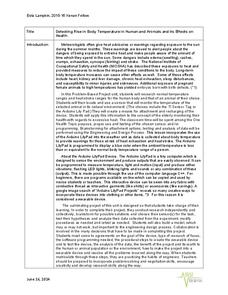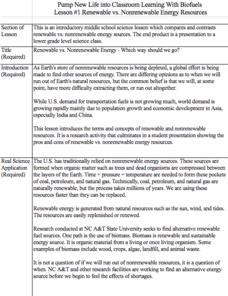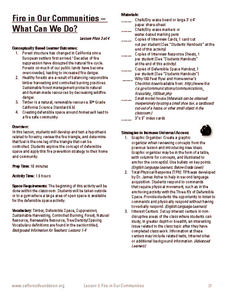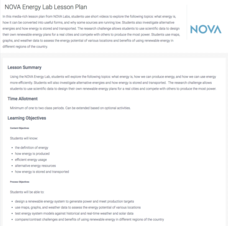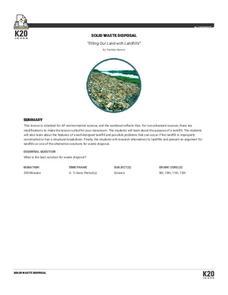Seussville
What Can Your Class Do?
Inspire scholars to do their part for planet Earth with a read-aloud of Dr. Seuss's The Lorax, and variety of activities designed to boost the environmental activist in us all. Activities include writing poems about the Earth, sorting...
Kenan Fellows
Detecting Rise in Body Temperature in Human and Animals and its Effects on Health
Beat the heat using sensors. Scholars research normal body temperatures for humans and a specific animal. In groups, they create sensors that monitor body temperature, as well as the weather. The goal is to reduce the occurrence of heat...
Kenan Fellows
Renewable vs. Nonrenewable Energy Resources
Is one type of energy inherently good or bad? Young scientists explore energy resources in a week-long unit. After extensive research, groups create powerful position statements and presentations supporting their energy resource of choice.
Alliance Theater
The Jungle Book Post-Show STEAM Lesson
An ecosystem is really just the flow of energy through many different living organisms. A study of Rudyard Kipling's The Jungle Book leads to an environmental science activity in which learners study how various factors can affect...
NOAA
The Incredible Carbon Journey: Play the Carbon Journey Game
Class members explore the carbon cycle in the final installment of the 10-part Discover Your Changing World series. They play a simulation game where they walk through the steps carbon takes as it cycles through the different layers of...
WindWise Education
What Factors Influence Offshore Wind?
What is that out in the water on the horizon? Teams work together to study the coastline using maps to determine the best and worst locations to place an offshore wind farm. The teams then build a scale model wind farm to see what it...
WE Charity
High School–Module 3: Food Waste
Advances in packaging and refrigeration help keep food fresher longer. That's just one of the ways science is addressing global food waste. With the third of five lessons from the WE Are Innovators—High School Modules set, scholars use...
Forest Foundation
Fire in Our Communities - What Can We Do?
Learn about defensible space and renewable resources with a lesson about forest fires. After exploring the ways that humans have impacted the environment, kids conduct mock interviews about differing points of view in the conservation...
Curated OER
How Will We Create a Future without Waste?
Many young people act globally by reducing, reusing, and recycling, Now they take it to the next level by upcycling. Middle schoolers design a proposal to eliminate waste by exploring the new material cycle and applying their knowledge...
PBS
NOVA Energy Lab Lesson Plan
Can our energy resources keep up with our ever-growing population? Science scholars learn the basics of energy and Earth's energy resources during an electrifying instructional activity. The resource combines video clips and an...
Curated OER
Indigenous Peoples’ Day Lesson Plan
Indigenous Land Guardianship, Settler Colonialism, Racial Capitalism. While the terms may be new to some, they feature in a lesson plan designed for Indigenous Peoples' Day. Young scholars investigate four concepts: Land...
National Wildlife Federation
Quantifying Land Changes Over Time Using Landsat
"Humans have become a geologic agent comparable to erosion and [volcanic] eruptions ..." Paul J. Crutzen, a Nobel Prize-winning atmospheric chemist. Using Landsat imagery, scholars create a grid showing land use type, such as urban,...
Wild BC
Is Climate Change Good for Us?
Is it really that big of a deal if the global climate undergoes a little change? Young environmentalists consider this very question as they discuss in small groups the impact of different climate change scenarios on their lives, their...
Science Matters
Island Fox Outreach
Off the coast of California lives a wild animal called the Island Fox. Experts discuss the importance of the Island Fox to the Channel Islands and the balance the fox creates within its ecosystem. The lesson concludes with a reading of...
K20 Learn
Filling Our Land with Landfills: Solid Waste Disposal
New ReviewThough it comprises only 5 percent of the world's population, the US generates 40 percent of the world's waste. Scholars learn about landfills, their safety, and other solid waste methods. They use experiments and research to learn more....
Kenan Fellows
Sustainability: Learning for a Lifetime – The Importance of Water
Water is essential for life—and understanding the importance of clean drinking water is essential in understanding sustainability! Show your environmental science class the basics of water testing and treatment through a week-long...
Kenan Fellows
Making Connections with Water Quality
What's in your water? And, why is water quality so important? Enhance your class's level of water appreciation through a lesson that demonstrates the necessity of water quality. Environmental enthusiasts explore the EPA's Clean Water...
National Wildlife Federation
Quantifying Land Changes Over Time in Areas of Deforestation and Urbanization
Is qualitative or quantitative research more convincing when it comes to climate change? In the eighth lesson during this 21-part series, scholars begin by performing a quantitative analysis of deforestation and urbanization. Then, they...
Polar Bears International
Taking Action!
Motivate young scientists to stand up and take action with this environmental science instructional activity. To begin, the class works in small groups brainstorming actions that support the conservation of the earth before creating and...
Seussville
The Lorax's Earth Day
Add a touch of Dr. Seuss whimsy to your Earth Day celebration with six pages consisting of Earth-friendly, inspiring, and engaging activities designed to enhance the beauty of your school campus and showcase the famous story, The Lorax.
Channel Islands Film
Santa Cruz Island - Visible Thinking Routines
Visible Thinking Routines are designed to help learners deepen their understanding of what they are learning and enable them to communicate their understanding of concepts to others. Individuals adopt one of these routines to use to...
NPR
Define the Plastic Problem
Individuals identify a specific problem concerning plastics and write a problem statement, which describes the problem, explains why it's a problem, and identifies desired solutions.
WE Charity
High School–Module 4: Energy and Housing
What features make a home energy-efficient? Pupils attempt to answer the question with the fourth instructional activity from the five-part WE Are Innovators—High School Modules set. Scholars learn how certain building materials help...
WE Charity
High School–Module 1: Sustainable Innovation
What does it mean to have an innovative mindset? Pupils think outside the box with the first of five lessons from the WE Are Innovators—High School Modules set. Scholars read articles and watch videos about sustainable innovation, such...



